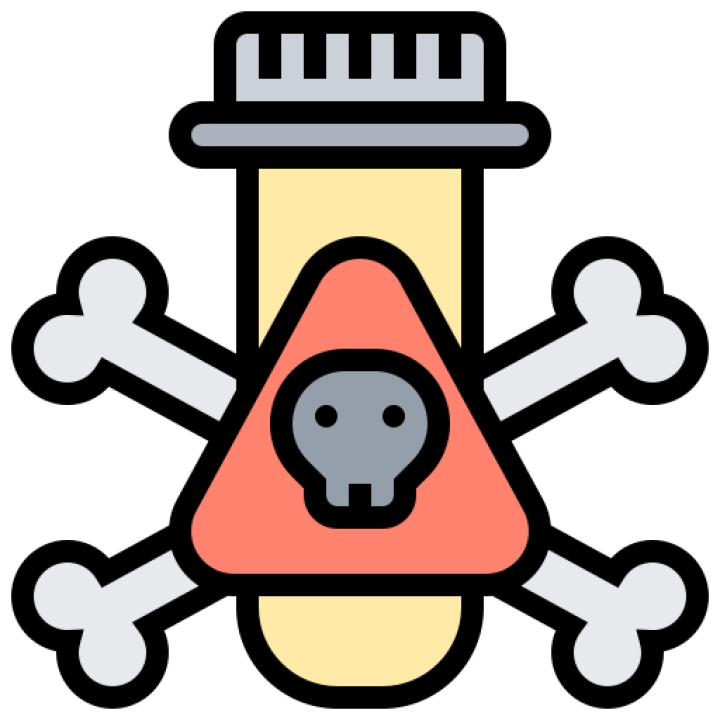College: Graduate School of Health Sciences
This specialization focuses on studying the harmful effects of drugs and other chemicals on living organisms. Students gain a deep understanding of the principles of toxicology, drug safety, and toxicity mechanisms. Graduates are prepared to work in pharmaceutical research, regulatory affairs, and healthcare industries.
Learning Objectives:
- Understand the basics of toxicology, including principles, mechanisms, and risk assessment.
- Develop skills in drug safety evaluation, conducting toxicological studies, and interpreting toxicology data.
- Learn techniques to assess the harmful effects of drugs and chemicals on biological systems.
- Explore principles of pharmacokinetics, metabolism, and the molecular basis of toxicity.
- Analyze and interpret complex toxicological data and regulatory guidelines.
- Develop critical thinking, problem-solving, and analytical skills for pharmaceutical research and regulatory affairs.
Core Curriculum:
- Introduction to Pharmaceutical Toxicology
- Overview of key concepts, principles, and research methods in toxicology.
- Basics of drug safety, adverse effects, and risk assessment.
- Principles of Toxicology
- Principles of toxicology, including dose-response relationships, toxicity mechanisms, and toxicokinetics.
- Techniques for conducting and interpreting toxicological studies.
- Drug Kinetics and Metabolism
- Basics of drug kinetics, absorption, distribution, metabolism, and excretion.
- Techniques for studying drug metabolism and the molecular basis of toxicity.
- Organ-Specific Toxicology
- Principles of organ-specific toxicology including liver toxicity, kidney toxicity, and neurotoxicity.
- Techniques for assessing adverse effects of drugs on specific organs.
- Genetic Toxicology
- Basics of genetic toxicology, mutations, and cancer.
- Techniques for evaluating the genetic and carcinogenic potential of drugs and chemicals.
- Regulatory Toxicology
- Principles of regulatory toxicology, safety guidelines, and regulatory compliance.
- Techniques for preparing and submitting regulatory documents and safety assessments.
- Clinical Toxicology
- Basics of clinical toxicology, poisoning, and emergency treatment.
- Techniques for managing and treating drug overdoses and poisoning cases.
- Research Methods in Toxicology
- Principles of research methods, experimental design, and data analysis in toxicology.
- Techniques for conducting and presenting toxicological research.
- Practical Training in Pharmaceutical Toxicology
- Practical experiences in pharmaceutical toxicology, including observations, internships, and practical projects in research labs, pharmaceutical companies, or regulatory agencies.
- Application of acquired skills in practical toxicology scenarios.
- Graduation Project in Pharmaceutical Toxicology
- Comprehensive project applying skills in toxic research, drug safety evaluation, or regulatory affairs.
- Presentation of a polished research project, toxic study, or regulatory submission.
Assessment Methods:
Research papers, toxicology studies, pharmacokinetic analyses, organ-specific toxicity reports, genetic toxicity assessments, regulatory compliance documents, clinical toxicology case studies, methodological research projects, practical training reports, graduation projects, group projects, and internship evaluations.
Recommended Textbooks:
- "Casarett & Doull's Toxicology: The Basic Science of Poisons" by Curtis D. Klaassen.
- "Principles of Pharmacokinetics and Pharmacodynamics" by Milo Gibaldi and Donald Perrier.
- "Genetic Toxicology" by various authors.
- "Regulatory Toxicology" by various authors.
- "Clinical Toxicology" by various authors.
- "Research Methods in Toxicology" by various authors.
Prerequisites:
Basic knowledge of biology, chemistry, and pharmacology. Suitable for students interested in pharmaceutical toxicology, drug safety, and regulatory affairs.
Duration:
Typically 4 years to complete a bachelor's degree, including coursework, projects, practical training, and internships.
Degree:
Graduates may earn a degree in pharmaceutical toxicology and pursue higher education or obtain professional certifications in related fields, such as a master's or doctorate in toxicology or pharmacology.
Target Audience:
Aspiring toxicologists, pharmacologists, regulatory affairs specialists, and individuals seeking careers in pharmaceutical research, regulatory agencies, healthcare industries, and related fields. This program equips students with theoretical, experimental, and analytical skills necessary to excel in pharmaceutical toxicology, supporting careers in pharmaceutical research, regulatory affairs, healthcare industries, and related fields.

